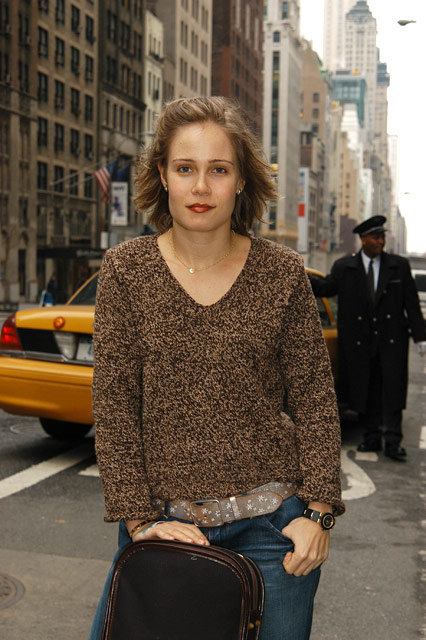Back to the Future: Leila Josefowicz finds fresh treasure in arrangements and rarities

Violinist Leila Josefowicz performs Saturday night at 92Y.
Leila Josefowicz doesn’t appear to be a revolutionary. The violinist’s debut recording, when she was 18, paired the Tchaikovsky and Sibelius concertos.
Since that 1995 release, she has made her distinctive mark in the classical world playing both standard and modern repertory, and collaborating with John Adams.
“Tradition decides so much of what we do in classical music,“ she said earlier this week, speaking from San Francisco. “I am here to challenge that to the end of my days. Some of it is valuable, but its [use is] so unthinking.”
Josefowicz aims to repurpose, and rethink the iconography of classical music by questioning every assumption about every work she plays. She’ll bring that approach to 92Y Saturday evening, part of a five-city U.S. tour, with regular recital partner, pianist John Novacek.
Her program will offer Friedrich Herman’s arrangement of Sibelius’ beloved Valse Triste, Prokofiev’s Violin Sonata No. 1, the Sonata for Violin and Piano by Bernd Alois Zimmerman, and Adams’ Road Movies. “I consider this program very orchestral,” she says.
That is the concept for her tour— pairing one violin and one piano and having them think like an orchestra. Some dates will replace Zimmerman and Adams with Kaia Saariaho’s Calices, an arrangement of her own Graal Theatres violin concerto, and an arrangement of the Adagietto from Mahler’s Symphony No. 5.
Why the Sibelius? “Valse Triste is one of my favorite works. It’s not so easy to think of an opener for a recital program—[one] that’s not too long, that’s sort of an ear-amuser for the rest of the program.” As much of a chestnut as this piece is for orchestras, Josefowicz points out that on the contemporary scene, “arrangements seem kind of odd, we’re in an Urtext age, and arrangements are sort of frowned upon.”
Artistic and intellectual fashions come and go, with the consensus of the past often returning to replace that of the present, which itself eventually returns in an endless cycle. Arrangements are old-fashioned in every way, going back to the epoch when most people experienced music in the home by playing it themselves. But in the era not only of the Urtext but also ubiquitous recorded music, arrangements can still offer a refreshing way to explore values of the past to challenge the assumptions of the present.
Josefowicz believes Prokofiev’s First Violin Sonata is symphonic in scope and “could be made into an orchestral piece,” with four movements that present the familiar outline of a symphony, along with the composer’s intensity of expression.
“The opening is very abstract, very simple notation…this [sounds] very forward looking. Then there are certain parts that fit naturally in my perspective. Some of his writing is eccentric and forward thinking, some of his gestures are very abstract compared to other Prokofiev works.“He says in movement one, ‘this is supposed to sound like wind over gravestones.’
“I love this stuff,” the violinist said. “It’s like fuel for my fire. I will really try to make it sound like wind! It’s not going to be these beautiful, boring sextuplets.”
The Zimmermann performance will be notable for even happening. Josefowicz states that the composer, who’s hundredth anniversary comes next year, needs to be celebrated, “The U.S. doesn’t really know Zimmerman, and they need to. My goal is to bring great pieces to listeners that need to be heard, that are not heard nearly enough.”
Zimmermann is known, if at all, for his massive opera Die Soldaten, presented by the Lincoln Center Festival at the Park Avenue Armory in 2008. Though not a premiere, it’s likely that the sonata will be brand new to the audiences on this tour.
“This [piece] truly is orchestral,” Josefowicz said, and described that Zimmermann, “turned most of the material into a violin concerto with a huge orchestra. [The concerto] I’m recording in the spring with the Finnish Radio Symphony.
The Sonata was written 20 years before Die Soldaten, and is not just a relatively youthful but so obscure in Zimmermann’s output that it doesn’t always appear on lists of his works.
Zimmermann has a forbidding image, mostly due to the opera and the lack of experience with his other music. But one consistent thread throughout his career was an almost naïve love for gospel, blues, and old-fashioned dance music. “It’s held a special place in my heart, and I’m really glad to be playing it,” says Josefowicz.
Then there’s Road Movies, which Josefowicz and Novacek recorded on a Nonesuch CD with the same title. A sonata in all but name, the piece is, “one of our classics. John Adams is probably one of my most dear people to me, I’ve been close with him for a good 20 years, so this is a natural choice.”
That friendship was on public display most recently when the violinist premiered Adams’ latest concerto, Scheherazade 2.0 with the New York Philharmonic in 2015 (she also made the premiere recording with David Robertson and the St. Louis Symphony).
“I’m incredibly privileged to play all these brand new scores with these brand new sounds,” says Josefowicz.
Leila Josefowicz and John Novacek perform music of Sibelius, Prokofiev, Zimmermann, and Adams 8 p.m. Saturday at 92Y. 92Y.org


